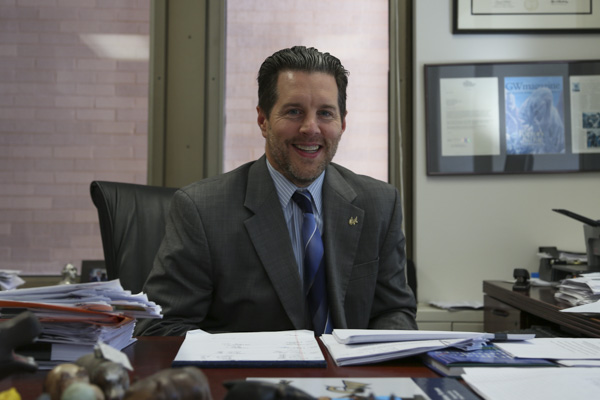The Division of Student Affairs is getting creative about how to deal with budget cuts.
GW’s top student affairs leader said the division is handling budget cuts by whittling down the amount the office spends on travel and consolidating positions. Experts said these strategies are common ways to handle budget cuts but could still impact the morale and efficiency in the office.
The current changes come after University President Steven Knapp asked central administrative departments last December to make 3 to 5 percent budget cuts each fiscal year until 2021.
During the first round of these budget cuts, student affairs eliminated the director of academic integrity and the senior associate dean of students positions. A new division, the Office of Student Support and Family Engagement, now oversees military and veteran students, parent engagement and the Office of Student Rights and Responsibilities.
Dean of Student Affairs Peter Konwerski said although only a few staff positions were eliminated in the budget cuts, the office has reorganized and is now considering if empty positions’ duties can be absorbed by other staff members.
“We are in a constant phase of adjusting. We are getting used to it now,” Konwerski said. “We knew that with some openings it would prevent us from having to let someone else go.”
Konwerski said roles in units including the Student Support and Family Engagement, the Center for Student Engagement, Student Rights and Responsibilities and the Division of Student Affairs have shifted responsibilities to combine positions.
“As positions come open, we thoughtfully review the role and function and then make a determination about whether to refill that position, whether we change it’s scope or function or how we might reenvision position responsibilities, as we continue our mission to support our students,” Konwerski said.
The student affairs office aims to continue to serve students and limit the impact of budget cuts on their experiences, Konwerski added.
“I will be the first to say it: These cuts have an impact on our University,” Konwerski said. “What we want to do is have it have little impact on the student experience. Our goal is to make sure we deliver high quality service and make sure you are not negatively affected by GW’s behind-the-scenes administrative bureaucracy.”
The student affairs division has instituted a committee to focus on professional development and teamwork and host events like potlucks to boost staff morale, which could be affected by staff reorganization.
Konwerski added they now only send one staff member to conferences to conserve money.
“The budgets are tighter so things like professional development are often reduced so we have to be more efficient,” Konwerski said. “Sometimes instead of going to a conference we will bring that person to us, which allows us not to pay for the travel costs of multiple people going there.”
When training many staff members at once, it makes more sense to visit a local organization, like the American College Personnel Association, than to pay for flight costs to an off-site conference, he added.
Experts said GW’s strategies for dealing with the budget cuts are common first steps to minimize student impact, but staff morale may suffer anyway.
Jeanna Mastrodicasa, co-chair of assessment, research and evaluation knowledge community with the National Association of Student Personnel Administrators, said administrators usually try to find ways to cut budgets that will not majorly impact staff.
“In my 19-year career in higher education, I have seen travel restrictions, the cutting of vacant positions, the reduction of filled positions and many other ways to reduce a budget,” Mastrodicasa said. “All reductions impact staff morale, making it a leadership challenge to try to keep it positive. Higher education leaders are always looking for ways to reduce the impact on current staff.”
Administrators are wise to be transparent with staff and students about the cuts, Mastrodicasa added.
“I recommend that the leadership be as transparent as possible about the various options and issues with the staff,” she said. “The more information that can be shared about budgets with student affairs staff, the better.”
Christopher Payne, associate vice chancellor for student affairs at the University of North Carolina at Chapel Hill, said GW’s plans to cut conference costs and reorganize positions should have minimal impact on students.
When UNC faced cuts, Payne said he made sure they would not majorly affect students.
“Just by the nature of the programs and services we provide in student affairs, anytime we incur a budget cut our immediate concern is the impact reduced funding will have on student safety, learning and success,” Payne said.
Dani Grace contributed to reporting.








